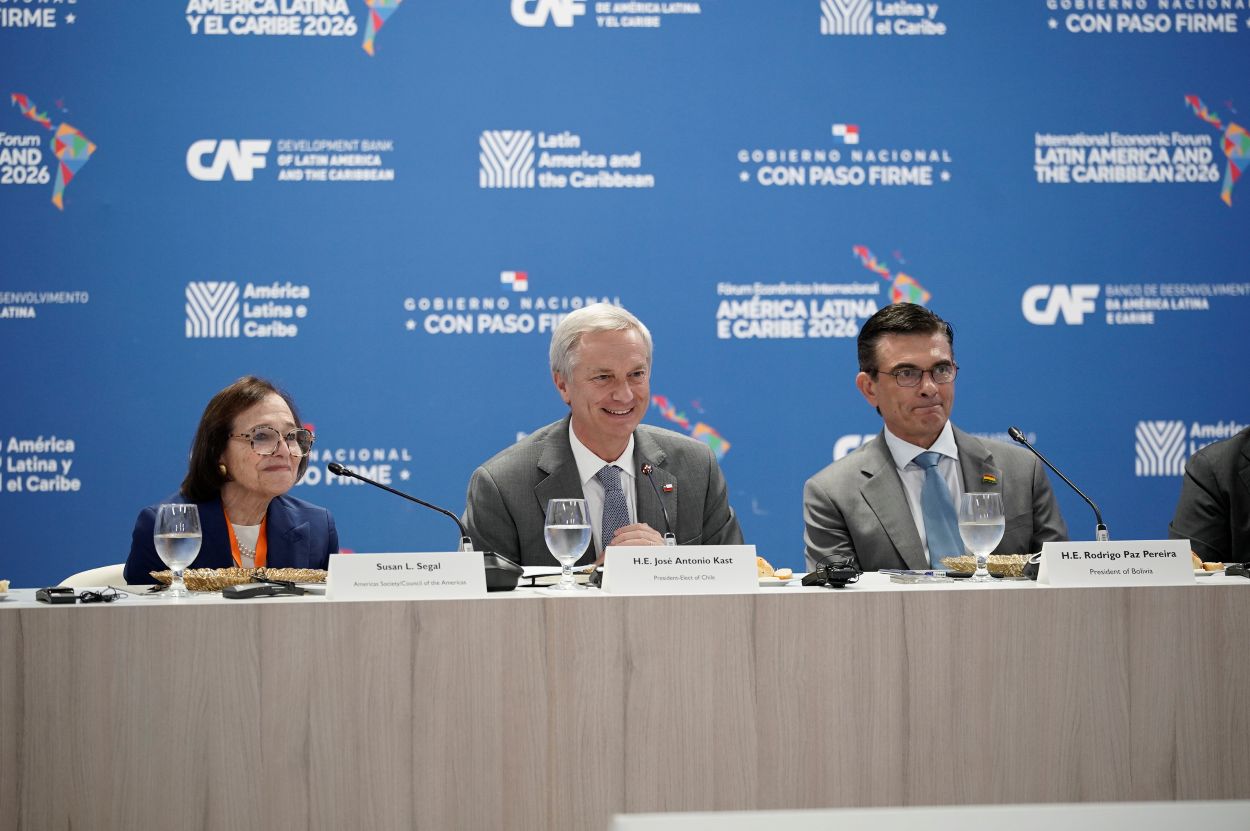Santiago's Children Book Launch
Santiago's Children Book Launch
AS/COA hosted Steve Reifenberg, author of a new memoir Santiago's Children covering his time working at a Chilean orphanage in the 1980s, at a panel discussion about the political and economic scenario in Chile from the early 1980s through a period of political reconciliation.
- Steve Reifenberg, Author of Santiago’s Children and Director, Harvard University David Rockefeller Center for Latin American Studies Regional Office, Santiago, Chile
- Pablo Bachelet, Latin American Correspondent, Miami Herald, and author of the Santiago's Children book review in the Americas Quarterly Spring 2008 issue
- Patricio Navia, Master Teacher and Adjunct Assistant Professor, New York University and Professor, Universidad Diego Portales, Santiago, Chile
- Christopher Sabatini, Senior Director of Policy, AS/COA and Editor-in Chief, Americas Quarterly (Moderator)
Chile in the early 1980s serves as the backdrop of Steve Reifenberg’s new memoir, Santiago’s Children: What I Learned about Life at an Orphanage in Chile, about his time working as a volunteer at the Hogar Domingo Savio. In 1982 and 1983, Chile suffered an economic recession and saw political challenges to General Augusto Pinochet’s rule. The national GDP contracted 14 percent in 1982 and unemployment reached 30 percent during that period. AS/COA hosted a May 13 book launch, during which panelists discussed Chile in the 1980s, as well as reconciliation efforts in the post-Pinochet era.
Reifenberg discussed how politics and the economy shaped everyday lives during the time he worked at the orphanage. Income was scarce, challenging the financial stability of the Hogar Domingo Savio where he helped care for 13 children. The children achieved different levels of success in life, reflecting broader social and public policy changes. While the economy and social policy funding have improved and social stratification of the kind Reifenberg observed has diminished since the 1980s, providing equal access to quality education remains a public policy challenge today.
The Chile of the mid-1980s was politically polarized, said the Miami Herald’s Pablo Bachelet, who visited in 1984 then returned in 1986 to live in Chile for 13 years. But in spite of social divisions and political restrictions imposed by the regime, said Bachelet, civil society existed at this point, galvanized in part by the regime’s torture practices. Reifenberg notes in his memoir, for example, a church service where victims of torture recounted their experiences. The Catholic church and certain organizations gave public voice to the counts of torture.
Using the children’s experiences to set the book’s narrative framework distills the political scenario of the time, said New York University’s Patricio Navia. The memoir shows how legislation affects the lives of real people, while examining policies top-down may lead one to ignore reality, he argued. Part of the political tension that Reifenberg witnessed was economic backlash, he said; politics can be a bottom-up affair.
Comparing the past with the present, panelists offered different views on how Chile has changed over the past two decades. Reifenberg described the persistence of inequality and class distinctions, focusing on the lives of the children he mentored and with whom he maintains contact. One of the orphans—who was at the top of her class, but who attended one of the poorest and least respected public schools—pretended she lived in another school district to obtain an internship. This reflects, he said, a public policy challenge for Chile: delivering quality education.
In a discussion of Chile’s political climate, Bachelet argued that the 1980s political polarization diminished for two reasons. First, Chile’s economy recovered and grew significantly. Second, Patricio Aylwin, the first president elected post-Pinochet, led reconciliation efforts between 1990 and 1994.
Raising the question of institutional memory, moderator Christopher Sabatini asked how Chile could best put the past behind it. Panelists agreed that the reconciliation process has been critical to this end. The undeniable systemic nature of the torture, stated Navia, forced awareness and opened reconciliation dialogues. The arrests of Pinochet and General Manuel Contreras, head of the Pinochet-era National Intelligence Directorate (better known as DINA), were also important turning points in moving toward reconciliation.
Chilean institutional memory is selective, said Navia. Citing research by historian Steve Stern of the University of Wisconsin, Navia argued that Chileans select which memories they choose to remember or forget from a “memory box.” While most of Chilean society has moved on, the elite have not. The candidates for next year’s presidential election, he said, were all involved with the democratic transition in 1989; nearly two decades afterward, the political elite has not transitioned. Countries cannot build their future, he cautioned, if they do not come to terms with their past.








